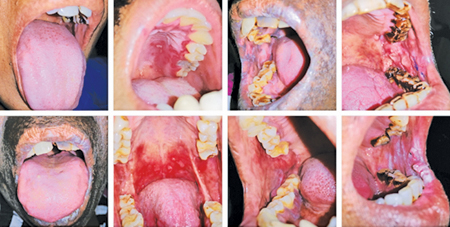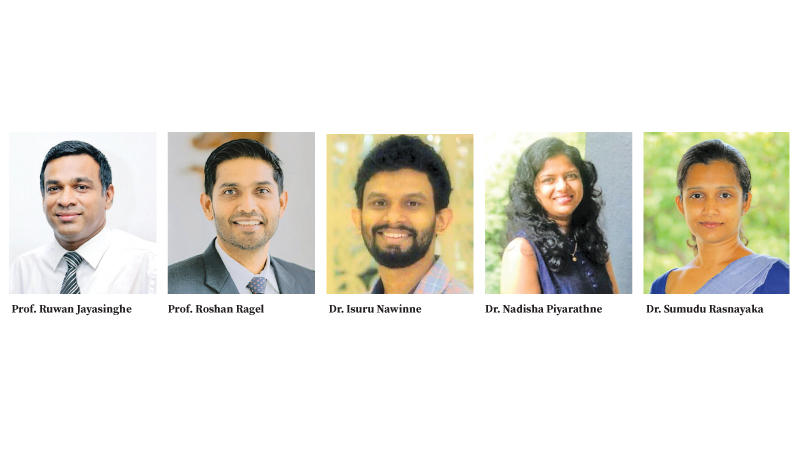Oral cancer or cancer in the mouth is a debilitating disease, commonly seen in the low socioeconomic sector of society. According to recent statistics reported by the Ministry of Health for the year 2021, there were more than 2500 new cases of oral cancer accounting for 15 percent of all cancers reported in males. Smoking, Betel quid chewing, heavy alcohol consumption together with genetic background and poor nutrition are reasons that contribute to the development of oral cancer. Many patients are presented to clinics when the cancer is in the advanced stage. At advanced stages, the treatments are costly and often complicated. It is important to identify these patients early, especially at the pre-cancer stage, so that there is a higher chance of successful treatment.
To address this problem, a group of researchers from the University of Peradeniya embarked on a research project to develop a novel approach to help early detection of oral cancer. This project was conducted as collaboration between the Faculty of Dental Sciences, the Department of Computer Engineering, the Faculty of Engineering and the Centre for Research in Oral Cancer, of the University of Peradeniya. Initial funding for this project was obtained from the Multidisciplinary Grants (127) from the University Research Council, University of Peradeniya.

Images used to train the artificial intelligence model to detect mouth cancer
“There are only a limited number of specialists and specialist centres that can diagnose oral cancer, and delayed presentation is a major problem the clinicians face,” says Professor Ruwan Jayasinghe, the clinical lead of this project. To address this gap, we invited the Computer Engineering Department of the Faculty of Engineering at the University of Peradeniya to help solve this problem through technology.
As the first step, a database of patients with oral cancer and pre-cancer disease was developed. This database included patients’ age, sex, clinical details, risk habits such as smoking, alcohol and betel chewing and images of the mouth. The images were taken using regular mobile phone cameras of the dentists attending to patients. More than 3000 high-quality images of the mouth were included in this database. Strict confidentiality of the patients was maintained at all stages, personal details were not stored or recorded, and patients were identified by a number only. The clinicians in the research team categorised and labelled the image database into groups. A new software tool called “OASIS-Annotator” was developed by the computer engineering team to facilitate this process.
Using this database, an Artificial Intelligence model was developed to diagnose the pre-cancer lesions of the mouth. The developed model was 80 percent accurate in diagnosing the pre-cancer stage of oral cancer using images obtained from mobile phone cameras and other data (age, sex and habits) of patients. This is the first time that such technology was developed using data from Sri Lankan patients. So far, this project has yielded two research papers which have been accepted for publication in high-quality international research journals.
As the next step, we have planned to develop a mobile phone app to assist dentists in the early detection of oral cancer. This app will enable them to upload oral images of patients together with other details (age, sex and habits) and get confidential advice from specialists. This will help to minimise delays in diagnosing and mitigate issues such as long waiting times; cost and time spent travelling to specialised centres. At a later stage, we can incorporate the artificial intelligence model into this app, which can provide additional support to dentists to help diagnose oral cancer.
“We aim to build an ever-evolving artificial intelligence-driven mobile app with real-life applications to facilitate early detection of oral cancer,” says Dr. Isuru Nawinne, from the computer engineering department. Additional funding is needed to expand the project to achieve this goal. “The database needed to be expanded including patients from different parts of the country to improve the accuracy of the artificial intelligence model. In addition, we need the help of the Ministry of Health to pilot test the mobile app in the hospital setting with primary care dentists and facilitate the incorporation of artificial intelligence technology into Sri Lankan hospital setup and administrative framework” he further adds.
During this study, it was discovered that there are several barriers to incorporating new technology into healthcare settings in Sri Lanka. These include misconceptions about confidentiality, security, a sense of monitoring from another authority and accuracy. These barriers can be eliminated through adequate training and knowledge expansion for both dentists and patients.
In a resource-constrained setting like Sri Lanka, well-trained qualified staff is scarce and facilities to conduct specialised tests to diagnose oral cancer are only available in a limited number of hospitals. When a dentist at a remote hospital identifies a suspicious lesion in the mouth of a patient, this patient is referred to a specialist centre. Often, patients do not present at these centres in time, and long waiting times are encountered in these centres, resulting in the progression of the cancer into an advanced stage. Issues such as travelling distance, lodging, high cost and loss of daily wages are the reasons behind this presentation. Therefore, a remote monitoring system using mobile phones assisted by artificial intelligence technology can be a cost-effective and time-saving solution to identify oral cancer at an early stage.
This project was acclaimed by the international research community for its novelty and high translational potential. Artificial intelligence technology has been used in the world to predict the development of cancer even before its onset. This work has the potential to expand into a stage where patients at home can upload an image of a lesion of the mouth and get specialist advice, or even get a diagnosis through a mobile phone app. Even a specialist from overseas can provide confidential advice on the management of patients through this technology.
The Centre for Research in Oral Cancer, situated at the University of Peradeniya is the only dedicated centre for research concerning oral cancer in the country. University of Peradeniya is committed to developing high-impact research with multiple disciplines involved. Further, research that has the potential to transform the everyday life of the people is given priority, as this will pave the way for citizens in Sri Lanka to reap direct benefits of research conducted in the university.
This project has the potential to deliver the latest technology such as artificial intelligence to improve healthcare in the country. Combined efforts from all stakeholders, including public awareness, patient compliance, awareness of dentists, technical assistance, and research development from academics and support from policymakers are equally important to make this goal a reality.
Link to research papers of this study:
https://www.sciencedirect.com/science/article/pii/S1368837524002641
https://ieeexplore.ieee.org/abstract/document/10664507/
Researchers from the University of Peradeniya
Dr. Nadisha Piyarathne
Dr. SumuduRasnayake
Dr. IsuruNawinne
Prof. Roshan Ragel
Prof. Ruwan Jayasinghe









